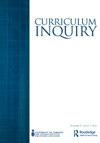Palimpsests for reading politics and reconfiguring power within and beyond learning spaces
IF 1.6
3区 教育学
Q2 EDUCATION & EDUCATIONAL RESEARCH
引用次数: 0
Abstract
Just after logging into the online meeting room, each of us—still joining from the comforts of our home office spaces following the shift there due to the COVID-19 pandemic in March 2020—quickly moved past pleasantries. Ahead of diving into the task of threading together the four articles that constitute this issue, we shared reflections on the array of contemporary headlines and happenings that filled our social media feeds, blared across mainstream media, and occupied our thoughts on the first day of November 2022. From then-looming decisions from the Supreme Court of the United States about affirmative action to the just-announced decision for nearly all Ontario public schools to close amidst a breakdown in labour negotiations between education workers and Ontario’s Conservative government, we did not need to look far to see politics and power intersecting with education. Within regressive educational spaces, protest signs, picket lines, and human rights discussions are increasingly considered far “too political” for everyday classroom happenings, under the fallacy that schooling and curricula can and should remain “neutral” so as not to cause a further rupture in the fabric of society. Frequently framed as a protective measure, proponents of a cis-white-patriarchy and white supremacist settler-colonial status quo articulate their argument as one symbolic of maintaining a (nationalist) truth, particularly as related to identity and place. Conversely, as we have learned from the political work of Black, Indigenous, and trans communities, as well as others targeted by racial capitalist social formations, we know an alternative view of education suggests we must take “an overtly political orientation to teaching and learning” (Luke, 2014, p. 21). We understand the urgency of reading politics in everyday actions and communications to cultivate fertile ground for reconfiguring power and, ultimately, societal change. The authors of the four articles in this issue offer readers reflective insights, critical perspectives, and potential pathways for doing just that. Cumulatively, we read these four articles as emblematic of what Jon M. Wargo and colleagues in their article in this issue describe as “palimpsests for reading how power can be reconfigured for a more equitable social order and just future” (p. 566). Within each article, authors foreground and call for imagining “otherwise” as a necessity for educational and social justice, rather than simply a strategy for surviving the “narrow confines of schooling institutions” (Pham, this issue, p. 518). With progressives’ efforts解读政治和在学习空间内外重新配置权力的重写本
登录在线会议室后,由于2020年3月新冠肺炎疫情,我们每个人都从舒适的家庭办公空间加入会议室,很快就摆脱了玩笑。在着手整理构成这一问题的四篇文章之前,我们分享了对2022年11月第一天充斥我们社交媒体、在主流媒体上大肆宣扬并占据我们思想的一系列当代头条新闻和事件的思考。从那时美国最高法院即将做出的关于平权行动的决定,到刚刚宣布的在教育工作者和安大略省保守党政府之间的劳资谈判破裂的情况下关闭安大略省几乎所有公立学校的决定,我们不需要看太远就可以看到政治和权力与教育的交叉。在倒退的教育空间里,抗议标志、纠察线和人权讨论越来越被认为对日常课堂活动“过于政治化”,因为人们认为学校教育和课程可以而且应该保持“中立”,以免造成社会结构的进一步破裂。独联体白人父权制和白人至上主义定居者殖民现状的支持者经常被视为一种保护措施,他们将自己的论点阐述为维护(民族主义)真理的象征,尤其是与身份和地点有关的真理。相反,正如我们从黑人、土著和跨性别社区以及其他被种族资本主义社会形态所针对的社区的政治工作中了解到的那样,我们知道另一种教育观表明,我们必须“对教学采取公开的政治取向”(Luke,2014,第21页)。我们理解在日常行动和沟通中解读政治的紧迫性,为重新配置权力并最终实现社会变革培育肥沃的土壤。本期四篇文章的作者为读者提供了反思性的见解、批判性的视角和潜在的途径。总的来说,我们阅读这四篇文章,将其视为Jon M.Wargo及其同事在本期文章中所描述的“解读权力如何重新配置以实现更公平的社会秩序和公正未来的重写本”(第566页)的象征。在每一篇文章中,作者都强调并呼吁将“其他”想象为教育和社会正义的必要条件,而不仅仅是在“教育机构的狭窄范围”中生存的策略(Pham,本期,第518页)。在进步人士的努力下
本文章由计算机程序翻译,如有差异,请以英文原文为准。
求助全文
约1分钟内获得全文
求助全文
来源期刊

Curriculum Inquiry
EDUCATION & EDUCATIONAL RESEARCH-
CiteScore
3.10
自引率
17.60%
发文量
37
期刊介绍:
Curriculum Inquiry is dedicated to the study of educational research, development, evaluation, and theory. This leading international journal brings together influential academics and researchers from a variety of disciplines around the world to provide expert commentary and lively debate. Articles explore important ideas, issues, trends, and problems in education, and each issue also includes provocative and critically analytical editorials covering topics such as curriculum development, educational policy, and teacher education.
 求助内容:
求助内容: 应助结果提醒方式:
应助结果提醒方式:


